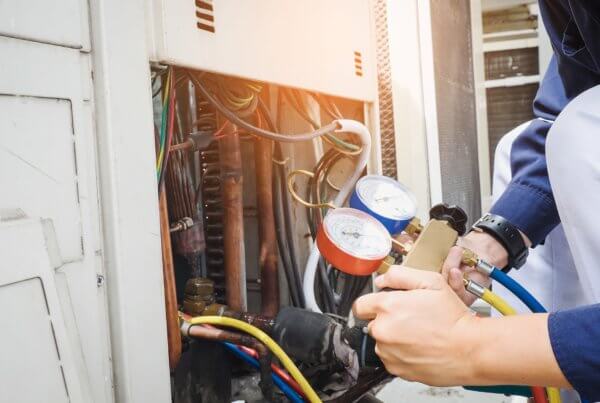Summer is just around the corner, and if you are like the rest of us, that means blasting the AC. There is nothing like coming home from a hot summer day to a cool, relaxing space. Unfortunately, all of that wear and tear on your air conditioner can cause your AC to break down. If you’ve ever had your air conditioning system break down in the heat of summer, you understand the frustration.
The best way you can stay prepared for an AC break down is catching it quickly. Many homeowners wait too long, so their once minor repair becomes a costly replacement. While, each home varies depending on insulation values, air conditioner location, actual system, ductwork, and equipment specifications, there are a few signs you can know that yours is on its way out.
The Tell-Tale Signs of a Broken Air Conditioner
- Does it feel warm in your house?
One of the easiest ways to know that your air conditioner isn’t working correctly is to feel the air coming out of it. If you think something is wrong with your unit, check the air coming out of the supply vents. This air should feel cold if your outdoor AC unit is running in its air conditioning mode. If you notice that the air is considerably less cold than it should be or is warm, there might be a bigger issue happening within your system.
If you notice that there is warm air coming out of your supply vents or the air ventilating through your home, please contact a Manwill certified technician. They will walk you through the next steps which should include turning off your air conditioner as soon as possible.
- Is air coming out of the supply vents?
Another sign there is an issue with your air conditioner is if your system is running and there is no air coming through the supply vents. If this happens, your evaporator coils could be iced over.
A frozen coil often indicates an issue with the airflow, such as restrictions caused by dirty air filters or obstructed return air ductwork. Blocked supply vents and frozen indoor coils could also be the result of low refrigerant. But you may not know until you investigate further. Work with our air conditioning contractors to get your AC up and running in tip-top shape.
- Have you changed your home air filters recently?
Another easy solution that could get your air conditioning running properly is changing your air filters. Dirty air filters can cause a variety of problems. An air filter keeps dust and debris out of your HVAC system, but if you forget to change your filters regularly, they could get clogged. A blocked air filter will prevent enough air from flowing through the system and cause additional wear and tear on other parts of the unit.
According to Energy Star, you should change your filter every month of use. That’s more often than most homeowners typically do but luckily changing an AC filter can be done on your own. However, if you are having trouble changing your filter, want hands-on instruction for future changes, or aren’t sure if a dirty air filter is the source of your problem, contact Manwill. We are here to help.
- Is your AC making strange noises?
If your air conditioner is making strange noises or being louder than usual, it’s highly likely something has gone awry. There are a variety of sounds that homeowners report when they suspect a breakdown. Here are a few of the most common ones.
- Screaming Noises
- Clanging, Banging or Knocking
- Bubbling/ Gurgling
- Screeching Sound
Each of these noises are signs of a significant problem with your air conditioning unit. For the best solution, contact Manwill immediately. We will help you narrow the issue down and give further instruction on what to do next.
If you are worried that your air conditioner needs repair, get in touch with our certified technicians. We can help you find a proper solution that gives you the best bang for your buck, as well as, a refreshing home for the upcoming hot, summer months.




